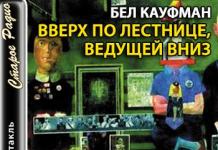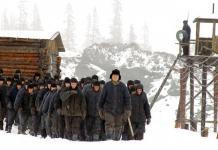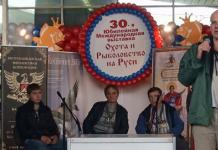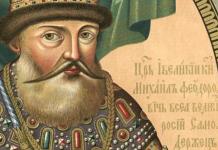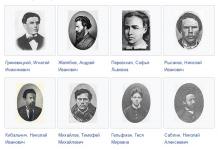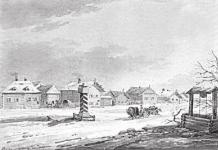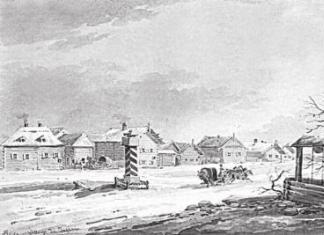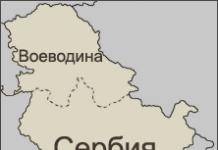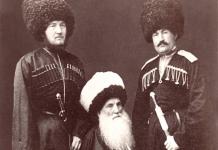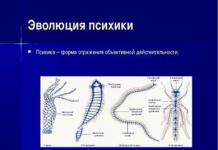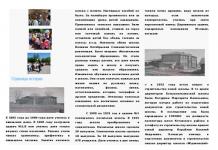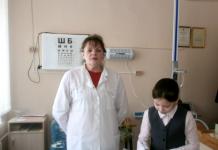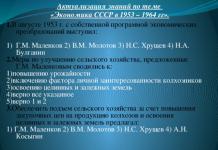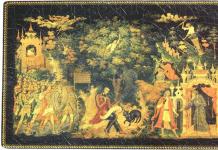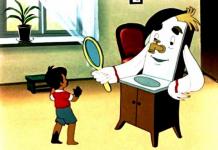Vadim Sergeevich Shefner was born on January 12, 1915 in Petrograd in the family of an infantry officer. He is the grandson of Alexei Karlovich Shefner, lieutenant commander, founder of the port of Vladivostok.
He spent almost all his childhood and youth in Petrograd-Leningrad. But in 1921, the family left for Staraya Russa to the place of his father's service. After the death of his father from consumption, Vadim Shefner, together with his mother-teacher, lived at an orphanage in Staraya Russa, after some time he returned to Petrograd. After school, he graduated from the FZU, in the 1930s he was a worker at various Leningrad factories.
In the first months of the Great Patriotic War, he was a private in an airfield service battalion near Leningrad, since 1942 he was a front-line correspondent for the newspaper of the Leningrad Front, Znamya Pobedy, and ended the war with the rank of senior lieutenant. Member of the CPSU (b) since 1945.
He began writing poetry at a young age. In 1933 he published his first poem "The Ballad of the Stoker" in the magazine "Cutter". Since 1938, he studied at the poetic seminar-studio "Youth Association" at the Writers' Union of the USSR (head - A. I. Gitovich, Yu. N. Tynyanov, A. A. Akhmatova, N. A. Zabolotsky, M M. Zoshchenko and others), where he became close friends with the poets V. A. Lifshitz and A. T. Chivilikhin. In 1940 he published his first book of poems, The Bright Coast.
The second book of poems ("Protection") was published in 1943 in besieged Leningrad. In 1943-1945 he created his largest poetic work - the poem "Meeting in the suburbs", which reflects the events heroic defense Leningrad.
AT post-war years along with poetic creativity, he was also engaged in poetic translation - with Chinese, from Sanskrit and Prakrit and from the languages of the union republics of the USSR (Georgian, Belarusian, Latvian, etc.). He has been publishing prose in magazines (Literaturny Sovremennik, Zvezda, etc.) since 1940. The first collection of prose ("Clouds over the road") was published in 1957. He considered the story "The Sister of Sorrow" to be his most significant prose work.
Since the 1960s, he has also worked in the science fiction genre, defining his fantastic works as "semi-probable stories" and "fairy tales for smart people."
In 1973-1975 he created the story "A Name for a Bird, or Tea Party on a Yellow Veranda" (with the subtitle "Chronicle of Impressions"), in which he laid the foundation for another layer of his work - memoir prose.
With a certain degree of conventionality in his prose, layers of orphanage and military stories, humorous and philosophical fiction can be distinguished. Many critics noted that it is impossible to draw a line between his fantastic work and creativity, where the fantastic component is not clearly expressed, and also called him "a science fiction writer in poetry."
He died on January 5, 2002 in St. Petersburg. The funeral service was held at the Vladimir Cathedral on January 8. According to the will of the writer, there were no civil memorial services and farewell speeches. He was buried at the Kuzmolovsky cemetery (Vsevolozhsky district of the Leningrad region).
Vadim Sergeevich Shefner - Soviet poet, prose writer, science fiction writer.
Born January 12, 1915 in Petrograd in the family of an infantry officer. He is the grandson of Alexei Karlovich Shefner, lieutenant commander, founder of the port of Vladivostok.
He spent almost all his childhood and youth in Petrograd (Leningrad). In 1921, the family left for Staraya Russa to join his father's job. After the death of his father from consumption, Vadim Shefner, together with his mother-teacher, lived at an orphanage in Staraya Russa, after some time he returned to Petrograd. After school, he graduated from the FZU, in the 1930s he was a worker at various Leningrad factories.
In the first months of the Great Patriotic War, he was a private in an airfield service battalion near Leningrad, since 1942 he was a front-line correspondent for the newspaper of the Leningrad Front, Znamya Pobedy, and ended the war with the rank of senior lieutenant. Member of the CPSU (b) since 1945.
He began writing poetry at a young age. In 1933 he published his first poem "The Ballad of the Stoker" in the magazine "Cutter". Since 1938, he studied at the poetic seminar-studio "Youth Association" at the Writers' Union of the USSR (head - A. I. Gitovich, Yu. N. Tynyanov, A. A. Akhmatova, N. A. Zabolotsky, M M. Zoshchenko and others), where he became close friends with the poets V. A. Lifshitz and A. T. Chivilikhin. In 1940 he published his first book of poems, The Bright Coast.
The second book of poems ("Protection") was published in 1943 in besieged Leningrad. In 1943-1945, Vadim Shefner created his largest poetic work - the poem "Meeting in the Suburbs", which reflects the events of the heroic defense of Leningrad.
In the post-war years, along with poetry, he also engaged in poetic translation - from Chinese, from Sanskrit and Prakrit, and from the languages \u200b\u200bof the union republics of the USSR (Georgian, Belarusian, Latvian, etc.). He has been publishing prose in magazines (Literaturny Sovremennik, Zvezda, etc.) since 1940. The first collection of prose ("Clouds over the road") was published in 1957. He considered the story "The Sister of Sorrow" to be his most significant prose work.
Since the 1960s, he has also worked in the science fiction genre, defining his fantastic works as "semi-probable stories" and "fairy tales for smart people."
In 1973-1975 he created the story "A Name for a Bird, or Tea Party on a Yellow Veranda" (with the subtitle "Chronicle of Impressions"), in which he laid the foundation for another layer of his work - memoir prose.
He died on January 5, 2002 in St. Petersburg. The funeral service was held at the Vladimir Cathedral on January 8. According to the will of the writer, there were no civil memorial services and farewell speeches. He was buried at the Kuzmolovsky cemetery (Vsevolozhsky district of the Leningrad region).
About myself:
I was born in Petrograd on January 12, 1915. My mother Evgenia Vladimirovna Shefner daughter of Vice Admiral Vladimir Vladimirovich von Lindeström, My father Sergey Alekseevich Shefner infantry lieutenant colonel; his father Alexei Karlovich Shefner was a military sailor. He left a good memory of himself in Russia: in Vladivostok there is Kapitan Shefner Street, and near the Far Eastern port of Nakhodka there is Cape Shefner.
Mother was Lutheran, father was Orthodox. I am baptized in the Orthodox Church.
We lived on the Sixth Line of Vasilyevsky Island. When it became hungry in Petrograd, my mother took me to the Tver province, to the village to the nanny. We lived there for five months. I remember the huge Russian stove, I remember how warm and cozy it was in the hut.
I spoke in detail about the days of my youth in the story "A Name for a Bird". There I told my readers about our departure in 1921 to Staraya Russa, where my father then served in the army. About my mother's anxieties and worries, about my father's death from consumption, about how I lived there, in the orphanage, where my mother got a job as a teacher, about my first lessons in the first grade of an old Russian school, about returning to my native St. Petersburg after almost four years of absence.
Mother read a lot. Not only prose, but also poetry. Her memory was excellent, she remembered many of the poems of Fet and Tyutchev, and Pushkin knew almost everything. One must think that it was from her that I inherited my love for poetry, but at first this love was somehow frivolous. I composed rhymes teasers, hooligan ditties, and in the sixth grade I even wrote an obscene song. And serious verses did not turn out.
In 1931, after graduating from a seven-year school, I did not dare to take an exam at a university, because I knew that I was stupid in mathematics and would not pass the exam. I decided to become a factory worker, as a joke called the students of the FZU (Factory Apprenticeship).
To do this, I went to the Labor Exchange, and there I received a referral to a technical school, which was located on Vosstaniya Street. I was accepted there without difficulty. I was enrolled in the Ceramics Group, and two years later I became a stoker at a porcelain factory (Proletary).
Porcelain firing is not an easy task, and serious people worked there. Then I finally began to write poetry in earnest, and in 1933 my poem was first published in the factory newspaper.
In 1934, my poems began to be published in city newspapers, and since 1936 in magazines. In 1940, the Leningrad publishing house "Soviet Writer" published my first book of poems, "The Bright Coast". I was admitted to the Union of Writers on the basis of her manuscript in 1939.
My left eye was irreparably damaged as a child, I can only see with my right eye. Therefore, before the war, I was a white ticket, not liable for military service, and I was not called up for military training. But when the Great Patriotic War began in 1941, I also came in handy here, I was called up and became a private in the 46th BAO (Airfield Maintenance Battalion). In the summer of 1942, I was transferred from this battalion to the army newspaper Znamya Pobedy. I worked there as a poet and as an ordinary journalist. After the Victory, he returned home with two military orders - "Red Star" and "Patriotic War II degree" and with medals, including the medal "For the Defense of Leningrad". I also have post-war awards. I consider the Pushkin Prize in 1997 to be the main one. My second book of poems was published in besieged Leningrad in 1943. A thin nondescript little book "Protection" in a paper cover. It contains all the poems about the war, about hometown mine. I keep it carefully.
The third book of poems "Suburb" was published in 1946, the fourth "Moscow Highway" in 1951, the fifth "Seaside" in 1955 ... But I will not list all my books here because among them there are unsuccessful. Instead, I will list books that include both relatively recent poems and selected poems of bygone days. Here they are: "Personal Eternity" 1984, "Years and Moments" 1986, "In this Century" 1987, "Architecture of Fire" 1997.
And the first place in terms of the number of poems is occupied by the first volume of my four-volume "Collected Works" published in 1991. It includes selected poems for half a century from 1938 to 1988.
My first prose story "Clouds over the road" was published in Leningrad in 1957. Looking from today, I confess that the story is not very successful. And my second book "Now, forever and never" does not please me today. But I consider my third book "The Happy Loser", published in 1965, to be successful. The story-tale "The Girl at the Cliff" included in it was later reprinted more than once, and in 1991 the Moscow publishing house "Knowledge" gave her a circulation of 500,000 copies.
I consider the story "Sister of Sorrow" to be my strongest prose work, it was published in 1970. This is a sad story about the blockade of Leningrad, about love. I still get good responses to this story. I am not offended by myself and for my fantastic novel "The Debtor's Shack". This is a very boring novel. This novel is stylistically adjoined by my Tales for the Smart, published as a separate book. I have already mentioned my autobiographical story "A Name for a Bird", and now I will say that in 1995 my other autobiographical story, "The Velvet Way", was published in the Zvezda magazine.

I was born in Petrograd on January 12, 1915. My mother - Evgenia Vladimirovna Shefner - daughter of Vice Admiral Vladimir Vladimirovich von Lindeström, my father - Sergey Alekseevich Shefner - infantry lieutenant colonel; his father Alexei Karlovich Shefner was a military sailor. He left a good memory of himself in Russia: in Vladivostok there is a street of Captain Shefner, and near the Far Eastern port of Nakhodka - Cape Shefner.
Mother was Lutheran, father was Orthodox. I am baptized in the Orthodox Church.
Fear distant relatives
More than tigers and wolves, -
Take to the sky, break into the earth,
To not hear their calls!
Shefner Vadim Sergeevich
We lived on the Sixth Line of Vasilyevsky Island. When it became hungry in Petrograd, my mother took me to the Tver province, to the village to the nanny. We lived there for five months. I remember the huge Russian stove, I remember how warm and cozy it was in the hut.
I spoke in detail about the days of my youth in the story “A Name for a Bird”. There I told my readers about our departure in 1921 to Staraya Russa, where my father then served in the army. About my mother's anxieties and worries, about my father's death from consumption, about how I lived there, in the orphanage, where my mother got a job as a teacher, about my first lessons in the first grade of an old Russian school, about returning to my native St. Petersburg after almost four years of absence.
Mother read a lot. Not only prose, but also poetry. Her memory was excellent, she remembered many of the poems of Fet and Tyutchev, and Pushkin knew almost everything. One must think that it was from her that I inherited my love for poetry, but at first this love was somehow frivolous. I composed rhymes - teasers, hooligan ditties, and in the sixth grade I even wrote an obscene song. And serious verses did not turn out.
In 1931, after graduating from a seven-year school, I did not dare to take an exam at a university, because I knew that I was stupid in mathematics and would not pass the exam. I decided to become a factory worker - this is how the students of the FZU (Factory Apprenticeship) were jokingly called.
To do this, I went to the Labor Exchange, and there I received a referral to a technical school, which was located on Vosstaniya Street. I was accepted there without difficulty. I was enrolled in the Ceramics Group, and for two years I became a stoker at a porcelain factory (Proletary).
| Vadim Sergeevich Shefner | ||||||||||||
| In the 1960s |
||||||||||||
| Name at birth: |
Lua error in Module:Wikidata on line 170: attempt to index field "wikibase" (a nil value). |
|||||||||||
|---|---|---|---|---|---|---|---|---|---|---|---|---|
| Aliases: |
Lua error in Module:Wikidata on line 170: attempt to index field "wikibase" (a nil value). |
|||||||||||
| Full name |
Lua error in Module:Wikidata on line 170: attempt to index field "wikibase" (a nil value). |
|||||||||||
| Date of Birth: |
Lua error in Module:Wikidata on line 170: attempt to index field "wikibase" (a nil value). |
|||||||||||
| Place of Birth: | ||||||||||||
| Date of death: |
Lua error in Module:Wikidata on line 170: attempt to index field "wikibase" (a nil value). |
|||||||||||
| Place of death: |
Lua error in Module:Wikidata on line 170: attempt to index field "wikibase" (a nil value). |
|||||||||||
| Citizenship (citizenship): |
Lua error in Module:Wikidata on line 170: attempt to index field "wikibase" (a nil value). |
|||||||||||
| Occupation: | ||||||||||||
| Years of creativity: |
With Lua error in Module:Wikidata on line 170: attempt to index field "wikibase" (a nil value). on Lua error in Module:Wikidata on line 170: attempt to index field "wikibase" (a nil value). |
|||||||||||
| Direction: | ||||||||||||
| Genre: | ||||||||||||
| Debut: |
poem "The Ballad of the Stoker" (1933) |
|||||||||||
| Prizes: |
Thumbnail creation error: File not found "Wanderer", "Aelita" |
|||||||||||
| Awards: |
|
|||||||||||
| Signature: |
Lua error in Module:Wikidata on line 170: attempt to index field "wikibase" (a nil value). |
|||||||||||
| Lua error in Module:Wikidata on line 170: attempt to index field "wikibase" (a nil value). | ||||||||||||
| [[|Works]] in Wikisource | ||||||||||||
| 15px Files at Wikimedia Commons | ||||||||||||
Vadim Sergeevich Shefner(-) - Soviet poet and prose writer, science fiction writer.
Biography
V. S. Shefner was born on December 30, 1914 (January 12) in Petrograd in the family of an infantry officer. He is the grandson of Lieutenant General Alexei Karlovich Shefner, founder of the port of Vladivostok.
He spent almost all his childhood and youth in Petrograd. But in 1921, the family left for Staraya Russa to the place of his father's service. After the death of his father from consumption, Vadim Shefner, together with his mother-teacher, lived at an orphanage in Staraya Russa, after some time he returned to Petrograd. After school he graduated from the FZU, in the 1930s he was a worker at various Leningrad factories.
Addresses in Petrograd - Leningrad - St. Petersburg
Creation
With a certain degree of conventionality in his prose, layers of orphanage and military stories, humorous and philosophical fiction can be distinguished. Many critics noted that it is impossible to draw a line between his fantastic work and creativity, where the fantastic component is not clearly expressed, and also called him "a science fiction writer in poetry."
He began writing poetry at a young age. In 1933, he published his first poem, The Ballad of the Stoker, in the magazine "Cutter". Since 1938, he studied at the poetic seminar-studio "Youth Association" at the Writers' Union of the USSR (head - A. I. Gitovich, Yu. N. Tynyanov, A. A. Akhmatova, N. A. Zabolotsky, M M. Zoshchenko and others), where he became close friends with the poets V. A. Lifshitz and A. T. Chivilikhin. In 1940 he published his first book of poems, The Bright Coast.
The second book of poems ("Protection") was published in 1943 in besieged Leningrad. In 1943-1945 he created his largest poetic work - the poem "Meeting in the suburbs", which reflects the events of the heroic defense of Leningrad.
In the post-war years, along with poetry, he also engaged in poetic translation - from Chinese, from Sanskrit and Prakrit, and from the languages \u200b\u200bof the union republics of the USSR (Georgian, Belarusian, Latvian, etc.). He has been publishing prose in magazines (Literaturny Sovremennik, Zvezda, etc.) since 1940. The first collection of prose ("Clouds over the road") was published in 1957. He considered the story "The Sister of Sorrow" to be his most significant prose work.
Since the 1960s, he has also worked in the science fiction genre, defining his fantasy works as "semi-probable stories" and "fairy tales for smart people". The most popular stories were The Girl at the Cliff (1963), The Palace for Three (1968), The Round Mystery (1969), and especially The Debtor's Shack (1981).
In 1973-1975 he created the story "A Name for a Bird, or Tea Party on a Yellow Veranda" (with the subtitle "Chronicle of Impressions"), in which he laid the foundation for another layer of his work - memoir prose.
Shefner connects realism with fantasy, likes to speak with imaginary seriousness about obvious nonsense or with humor about serious things; his fantasy also feeds on the fabulous element.
Prizes and awards
- State Prize of the RSFSR named after M. Gorky (1985) - for the collection of poems "Years and Moments" (1983)
- Pushkin Prize (1997)
- Award "Wanderer" in the nomination "Paladin of Fantasy" (1999)
- two Orders of the Patriotic War II degree (16.6.1945; 6.4.1985)
- Order of the Red Star (3.7.1944)
- medal "For the victory over Germany in the Great Patriotic War of 1941-1945"
Memory
Bibliography
Prose
Publications: Collected works, selected works
- Selected works in 2 volumes. L., Hood. literature, 1975, - 50,000 copies.
- Selected works in 2 volumes. L, Hood. literature, 1982 - 25,000 copies.
- Collected works in 4 volumes. L., Hood. literature, 1991-1995
Publications: Books of poetry
- Bright coast. - L.: Goslitizdat, 1940. - 104 p. - 5,000 copies.
- Protection. - L.: Goslitizdat, 1943. - 36 p.
- Suburb. - L.-M.: Soviet writer, 1946. - 102 p. - 10,000 copies.
- Moscow highway. - L.: Soviet writer, 1951. - 144 p. - 10,000 copies.
- Seaside. - L.: Soviet writer, 1955. - 132 p. - 10,000 copies.
- Poetry. - L .: Soviet writer, 1956. - 204 p. - 10,000 copies.
- An unexpected day. - L .: Soviet writer, 1958. - 148 p. - 5000 copies.
- Poetry. - M.-L.: Fiction, 1960. - 304 p. - 7000 copies.
- Earth signs. - L.: Soviet writer, 1961. - 124 p. - 5,000 copies.
- Close to the sky. - L.: Detgiz, 1962. - 192 p. - 100,000 copies.
- Poems. - L.: Lenizdat, 1965. - 300 p. - 50,000 copies.
- Vaults. - L.: Soviet writer, 1967. - 80 p. - 40,000 copies.
- Poems about Leningrad. - L.: Lenizdat, 1967. - 48 p. - 10,000 copies.
- Poems. - L .: Fiction, 1968. - 264 p. - 25,000 copies.
- Selected lyrics. - L .: Young Guard, 1969. - 32 p. - 100,000 copies.
- Height margin. - L.: Soviet writer, 1970. - 80 p.
- Poems. - L.: Lenizdat, 1972. - 288 p. - 25,000 copies.
- Colored glasses. - L .: Children's literature, 1974. - 160 p. - 50,000 copies.
- Memory lane. - L.: Lenizdat, 1976. - 272 p. - 25,000 copies.
- Departure side. - M .: Sovremennik, 1979. - 240 p. - 20,000 copies.
- North slope. - L.: Soviet writer, 1980. - 128 p. - 50,000 copies.
- Second memory. - L.: Soviet writer, 1981. - 272 p. - 50,000 copies.
- Years and moments. - M .: Sovremennik, 1983. - 328 p. - 25,000 copies.
- personal eternity. - L.: Soviet writer, 1984. - 288 p. - 50,000 copies.
- Years and moments. - M .: Soviet Russia, 1986. - 302 p. - 25,000 copies.
- In this century. - L.: Lenizdat, 1987. - 320 p. - 25,000 copies.
- Night swallow. - L .: Children's literature, 1991. - 206 p. - 50,000 copies. - ISBN 5-08-000012-0.
- Fire architecture. - St. Petersburg. : Petersburg writer, 1997. - 288 p. - ISBN 5-88986-003-8.
- Poems. - St. Petersburg. : Academic project, 2005. - 618 p. - 1000 copies. - ISBN 5-7331-0324-8.
Publications: Author's collections of prose
- Clouds over the road. L., Sov. writer, 1957 - 224 p., 30,000 copies.
- Now, forever and never. L., Lenizdat, 1963. - 366 p., 65,000 copies.
- Lucky loser. M-L., Sov. writer, 1965 - 464 p., 30,000 copies.
- Belated shooter. L., Soviet writer, 1968 - 540 p., 100,000 copies.
- Clouds over the road. L., Det. lit., 1969. - 224 p., 75,000 copies.
- Sister of sorrow. L., Lenizdat, 1970 - 352 p., 100,000 copies.
- The girl at the cliff. M., Znanie, 1971 - 224 p., 100,000 copies. (2nd ed. - 1991)
- Sister of sorrow. M., Sov. Russia, 1973 - 320 p., 75,000 copies.
- Humble genius. M., Young Guard, 1973. - 272 p., 100,000 copies.
- Name for a bird. L., Sov. writer, 1976. - 432 p., 30,000 copies.
- Name for a bird. L., Sov. writer, 1977. - 542 p., 100,000 copies.
- Round mystery. L., Det. lit., 1977. - 288 p., 100,000 copies.
- Sister of sorrow, Happy loser, Man with five "not" ("Tales of Leningrad Writers", L., Lenizdat, 1980) - 528 p., 50,000 copies.
- Name for a bird. L., Sov. writer, 1983 - 512 p., 200,000 copies.
- Debtor's shack. L., Lenizdat, 1983 - 576 p., 100,000 copies.
- Fairy tales for the smart. L., Lenizdat, 1985 - 542 p., 100,000 copies.
- Fairy tales for the smart. L., Hood. lit., 1987 - 542 p., 50,000 copies.
- Belated shooter. L., Sov. writer, 1987. - 672 p., 100,000 copies.
- Fairy tales for the smart. L., Lenizdat, 1990 - 620 p., 100,000 copies.
- The girl at the cliff. M., Knowledge, 1991
- Debtor's shack. M., Terra, 1994. - 394 p., 50,000 copies.
- Fairy tales for the smart. SPb., Hood. lit., 1995 - 588 p., 5,000 copies.
- Debtor's shack. SPb., Hood. lit., 1995. - 606 p., 5,000 copies.
- Sister of sorrow. St. Petersburg, Bibliopolis, 1995. - 476 p., 5,000 copies.
- Humble genius. M., Ripol-Classic, 1997 - 448 p., 20,000 copies.
- Uncle with capital letter. M., Ripol-Classic, 1998.- 444 p., 2,000 copies.
- Velvet path. St. Petersburg, Blitz, 1999 - 174 p., 3,000 copies
- Girl at the cliff (M., AST, 2002)
- Paradise on explosives (St. Petersburg, Azbuka-klassika, 2004)
- The Debtor's Shack (St. Petersburg, Terra Fantastica, 2004)
- Falling leaves of memories (St. Petersburg, Logos, 2007)
Theater and cinema
Screen adaptations
- - "Lucky loser", director Valery Bychenkov.
Performances
Write a review on the article "Shefner, Vadim Sergeevich"
Literature
- Kuzmichev, Igor. Vadim Shefner. Essay on creativity. - L., 1968.
- Kuzmichev, Igor. Poet Vadim Shefner. Introductory article to the book “Vadim Shefner. Poems". S-Pb., 2005.
- Fedotov, Valentin. Vadim Shefner: Leningrad Pages // Bulletin of the Tambov Center for Local Lore: scientific-inform. ed. - Tambov: "LLC Center-press", 2010. - No. 18, 20.
Notes
Links
| 30x30px | Portal "Literature" |
|---|---|
| 30x30px | Portal "St. Petersburg " |
| 30px | Vadim Shefner at Wikiquote |
| [[Lua error in Module:Wikidata/Interproject on line 17: attempt to index field "wikibase" (a nil value). |Vadim Shefner]] in Wikisource | |
| 30px | at Wikimedia Commons |
- in the library of Maxim Moshkov
An excerpt characterizing Shefner, Vadim Sergeevich
Caraffa stood pale as death itself, and looked at me, not looking away, piercing with his terrible black eyes, in which anger, condemnation, surprise, and even some strange, inexplicable delight splashed ... He kept deathly silence. And only his face reflected all his inner struggle. He himself was motionless, like a statue... He was deciding something.I was sincerely sorry for the people who had gone into “another life”, so brutally tortured, and probably innocent people. But I was absolutely sure that for them my unexpected intervention was deliverance from all horrific, inhuman torments. I saw their pure, bright souls go to another life, and sadness wept in my frozen heart ... It was the first time in many years of my complex "witch practice" when I took human life... And one could only hope that there, in that other, pure and gentle world, they would find peace.
Caraffa peered painfully into my face, as if wanting to know what prompted me to do this, knowing that, at the slightest wave of his “brightest” hand, I would immediately take the place of the “departed”, and perhaps I would pay very cruelly for it. But I did not repent ... I rejoiced! That at least someone with my help managed to escape from his dirty clutches. And surely my face told him something, because in the next moment Caraffa convulsively grabbed my hand and dragged me to another door...
Well, I hope you like it, Madonna! - and pushed me hard inside ...
And there... hung on the wall, as if on a crucifix, hung my beloved Girolamo... My affectionate and kind husband... There was no such pain, and no such horror that would not slash my tormented heart at that moment!.. I couldn't believe what I saw. My soul refused to accept it, and I helplessly closed my eyes.
- Well, what are you, dear Isidora! You will have to watch our little play! - Caraffa said threateningly affectionately. - And I'm afraid that I'll have to watch to the end! ..
So this is what this ruthless and unpredictable "holy" beast came up with! He was afraid that I would not break, and decided to break me with the torments of my loved ones and relatives! .. Anna!!! Oh gods - Anna! .. A bloody flash flashed in my tormented brain - my poor little daughter could be next!
I tried to pull myself together so as not to let Caraffe feel completely satisfied with this dirty victory. And also, lest he think that he managed to break me even a little, and he would not use this "successful" method on other members of my unfortunate family ...
- Come to your senses, Your Holiness, what are you doing! .. - I exclaimed in horror. “You know that my husband never did anything against the church! How is this possible?! How can you make the innocent pay for mistakes they didn't make?!
I perfectly understood that it was just an empty conversation, and that he would not give anything, and Caraffa also knew this very well ...
- Well, you, Madonna, your husband is very interesting for us! – sarcastically smiled “Grand Inquisitor”. “You can’t deny that your dear Girolamo was engaged in a very dangerous practice called anatomy? .. And doesn’t this sinful practice include such an action as digging in dead human bodies?...
– But this is science, Your Holiness!!! This is a new branch of medicine! It helps future doctors to better understand the human body so that it is easier to treat patients. Isn't the church already banning doctors?!..
- Doctors who are from God do not need such a "satanic act"! Caraffa shouted angrily. - A person will die if the Lord so decided, so it would be better if your “unfortunate doctors” took care of his sinful soul!
– Well, as I see it, the church “takes care” of the soul very intensively!.. Soon, I think, doctors will have no work at all... – I could not stand it.
I knew my answers pissed him off, but I couldn't help it. My wounded soul was screaming... I understood that no matter how hard I tried to be "exemplary", I could not save my poor Girolamo. Caraffa had some kind of terrifying plan for him, and he was not going to back down from him, depriving himself of such a great pleasure ...
- Sit down, Isidora, there is no truth at your feet! Now you will see that the rumors about the Inquisition are not fairy tales... There is a war going on. And our beloved church needs protection. And I, as you know, the most faithful of her sons...
I stared at him in surprise, thinking that Caraffa was gradually becoming really crazy...
- What war do you mean, Your Holiness? ..
- The one that goes around all of us every day !!! - for some reason, suddenly enraged, cried the Pope. - Which cleanses the Earth of people like you! Heresy must not exist! And as long as I am alive, I will destroy it in any manifestation - be it books, paintings, or just living people! ..
– Well, as far as books are concerned, I, with your “light” help, have a very definite opinion about this. Only it somehow does not fit in with your "sacred" duty, which you are talking about, Holiness...
I didn’t know what to say, what to do with him, how to stop him, if only this terrible, as he called it, “performance” would begin! I'm trying to pass the time. He was an excellent psychologist and did not allow me to continue my naive game.
- Get started! - he waved his hand to one of the tormentors of Caraff, and calmly sat down in an armchair ... I closed my eyes.
There was a smell of burning meat, Girolamo screamed wildly.
– I told you, open your eyes, Isidora!!! the tormentor yelled in fury. “You must enjoy the extermination of HERESY as much as I enjoy it!” This is the duty of every faithful Christian. True, I forgot who I'm dealing with ... You are not a Christian, you are a WITCH!
– Your Holiness, you are fluent in Latin... In that case, you should know that the word “HAERESIS” in Latin means CHOICE or ALTERNATIVE? How do you manage to combine two such incompatible concepts?.. Something is not visible that you leave someone the right of free choice! Or at least the slightest alternative? .. - I exclaimed bitterly. - A person SHOULD have the right to believe in what his soul is drawn to. You cannot FORCE a person to believe, because faith comes from the heart, not from the executioner!..
Caraffa looked at me in surprise for a minute, as if he was facing some unprecedented animal ... Then, shaking off his numbness, he said quietly:
“You are much more dangerous than I thought, madonna. You are not only too beautiful, you are also too smart. You shouldn't exist outside these walls... Or shouldn't exist at all, - and already turning to the executioner, - Continue!
The cries of Girolamo penetrated into the deepest corners of my dying soul and, exploding there with terrifying pain, tore it apart ... I did not know how much Caraffa intended to torment him before destroying him. Time crawled endlessly slowly, forcing me to die a thousand times... But for some reason, in spite of everything, I still remained alive. And I was still watching... Terrible tortures were replaced by more terrible tortures. There was no end to this... From cauterization with fire, they moved on to crushing bones... And when they finished this, they began to disfigure the flesh. Girolamo was slowly dying. And no one explained to him - for what, no one considered it necessary to at least say something. He was simply methodically slowly killed in front of my eyes in order to force me to do what the newly elected head of the holy Christian church wanted me to do ... I tried to mentally speak with Girolamo, knowing that I would not be able to tell him anything differently . I wanted to say goodbye ... But he did not hear. He was far away, saving his soul from inhuman pain, and none of my efforts helped ... I sent him my love, trying to envelop his tormented body with it and at least somehow reduce these inhuman sufferings. But Girolamo only looked at me with eyes clouded with pain, as if he was clinging to the only thinnest thread connecting him with this cruel, but so dear to him, and already slipping away from him world ...
Caraffa was furious. He could not understand why I remained calm, because he knew perfectly well that I loved my husband very, very much. The "Holy" Pope was burning with the desire to destroy me... But not physically. He only wanted to trample on my soul in order to completely subordinate my heart and mind to his strange and inexplicable desires. Seeing that Girolamo and I did not take our eyes off each other, Caraffa could not stand it - he yelled at the executioner, ordering my husband to burn out his wonderful eyes ...
Stella and I froze ... It was too terrible for our children's hearts, no matter how hardened they were, to accept this ... The inhumanity and horror of what was happening nailed us to the spot, not allowing us to breathe. This could not happen on Earth!!! It just couldn't! But endless longing in the golden eyes of Isidora she shouted to us - it could !!! Even as it could! .. And we just watched on helplessly, not daring to intervene, asking some stupid questions.
For a moment, my soul fell to its knees, begging for mercy ... Caraffa, immediately sensing this, stared at me with burning eyes in surprise, not believing in his victory. But then I realized that I was overjoyed too quickly ... Having made an incredible effort on myself and collecting all my hatred, I looked directly into his eyes ... Caraffa recoiled, having received a strong mental blow. For a second, fear flickered in his black eyes. But he disappeared just as quickly as he appeared ... He was an extremely strong and strong-willed person who would have delighted if he had not been so terrible ...
My heart sank in apprehension... And then, having received an approving nod from Caraffa, the executioner, like a butcher, calmly delivered a precise blow right into the heart of a helpless victim... My beloved husband, my gentle Girolamo ceased to exist... His kind the soul flew away to where there was no pain, where it was always calm and light ... But I knew that he would be waiting for me there, whenever I came.
The sky collapsed, spewing streams of inhuman pain. Fierce hatred, rising in my soul, crushed the barriers, trying to break out... Suddenly, throwing back my head, I howled with a frantic cry of a wounded beast, raising my disobedient hands to the sky. And from my luminous palms, the “magic of death”, which my dead mother once taught me, splashed right into Karaffa. Magic flowed, enveloping his thin body in a cloud of blue radiance. The candles in the basement went out, the thick impenetrable darkness seemed to have swallowed up our life... And only Caraffa still shone with a ghostly white-blue light. For a fraction of a second, I saw his eyes widened with anger, in which my death splashed ... Nothing happened to him! .. It was absolutely incredible! I hit anyone ordinary person"death magic", he would not have lived a second! Caraffa was alive and well, despite the blow that sizzled his life. And only around his usual golden-red protection, flashing bluish lightning now coiled like snakes ... I could not believe my eyes.
- So-so! .. Madonna Isidora went on the attack! his mocking voice sounded in the darkness. Well, anyway, it's getting more interesting. Do not worry, dear Isidora, we will have many more funny minutes with you! This I can promise you.
The disappeared executioner returned, bringing a lighted candle into the cellar. The bloody body of the dead Girolamo hung on the wall... My tormented soul howled, seeing this sad picture again. But, for nothing in the world, I was not going to show Karaffa my tears! Never!!! He was a beast that loved the smell of blood... But this time it was blood that was very dear to me. And I wasn't going to give this predator even more pleasure - I didn't mourn my beloved Girolamo in front of him, hoping that I would have enough time for this when he was gone ...
- Take it away! - Karaffa sharply ordered the executioner, pointing to the dead body.
– Wait!!! Don't I even have the right to say goodbye to him?! I exclaimed indignantly. “Even the church can’t refuse me that!” Rather, it is the church that should give me this favor! Doesn't she call for mercy? Although, as I understand it, we will not see this mercy from the Holy Pope!
– The Church owes you nothing, Isidora. You are a sorceress, and it is precisely on you that her mercy does not extend! - Caraffa said quite calmly. Your crying won't help your husband! Go and think about how to become more accommodating, without making yourself and others suffer so much in the same way.
He left as if nothing had happened, as if he had not just interrupted someone's precious life, as if everything was simple and good in his soul ... If he had a soul, as such, at all.
I was returned to my chambers, without being allowed to pay the last tribute to my dead husband.
My heart froze in despair and sadness, convulsively clinging to the tiny hope that perhaps Girolamo was the first and last of my unfortunate family whom this monster in the papal cassock made to suffer, and from whom he took his life so simply and having fun. I knew that neither the death of my father, and even more so - the death of Anna, I most likely could not survive. But I was even more frightened by what I understood - Caraffa also knew this ... And I racked my brains, making plans one more fantastic than the other. But the hope of surviving at least for the near future, in order to try to help their relatives, melted like smoke.
A week passed, Caraffa still did not appear. Perhaps he (just like me!) needed time to consider his next step. Or perhaps he was distracted by some other duties. Although the last one was hard for me to believe. Yes, he was the Pope... But at the same time, he was also an incredibly gambler, for whom it was beyond his strength to miss an interesting game. And playing cat and mouse with me gave him, I think, real pleasure ...
Therefore, I tried my best to calm down and find in my exhausted head at least some “smart” thought that would help me focus on our unequal “war”, from which, in reality, I had no hope of getting out the winner... But I still didn't give up, because for me a "surrendered person" was much worse than a dead person. And since I was still alive, this meant that I could still fight, even if my soul was already slowly dying ... I had to hold out at least a little in order to have time to destroy this deadly viper, which was Caraffa. .. Now I no longer had any doubts that I could kill him, if only the opportunity presented itself. Only here is how to do it, so far I have not had any the slightest idea. As I have just sadly seen from my own experience, it was impossible to destroy Caraffa in my “usual” way. So, I had to look for something else, but, unfortunately, I had almost no time for this.
I also thought about Girolamo all the time... He was always my warm protective “wall”, behind which I felt safe and protected... But now she was no more... And there was nothing to replace her. Girolamo was the most faithful and affectionate husband in the world, without whom a very important part of my world faded, becoming empty and cold. My life was gradually filled with sadness, longing and hatred... The desire to take revenge on Caraffa, forgetting about myself and how small my strength was compared to him... Grief blinded me, it plunged me into the abyss of despair, to get out of which I could only defeat him.
Caraffa came back into my life about two weeks later, at an early sunny morning, very self-confident, fresh and happy, and entering the room, joyfully said:
– I have a surprise for you, Madonna Isidora! I think you will like it very much.
I immediately broke out in a cold sweat - I knew his "surprises", they did not end well ...
As if reading my thoughts, Caraffa added:
It's really a pleasant surprise, I promise you. You will now see it for yourself!
Door opened. And a frail tall girl entered her, carefully looking around... Horror and joy fettered me for a second, not allowing me to move... It was my daughter, my little Anna!!!.. True, it was already difficult to call her little now , because in these two years she has greatly stretched and matured, becoming even more beautiful and even sweeter ...
My heart rushed to her with a cry, almost flying out of my chest! .. But there was no hurry. I did not know what the unpredictable Caraffa was up to this time. Therefore, it was necessary to keep very calm, which was almost beyond my human strength. And only the fear of making an irreparable mistake restrained my raging emotions rushing out like a hurricane. Happiness, horror, wild joy and fear of loss simultaneously tore me to pieces!.. Caraffa smiled contentedly at the produced effect... which immediately made me shudder inside. I didn’t even dare to think what might happen next ... And I knew that if something terrible happened, the desire to protect Anna might be too strong to resist Caraffe ... and I was terribly afraid that I could not refuse him so that he didn't ask for it.


